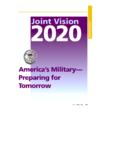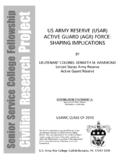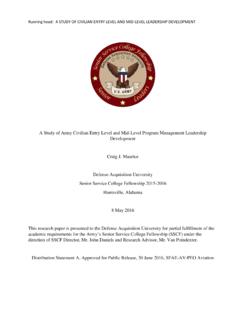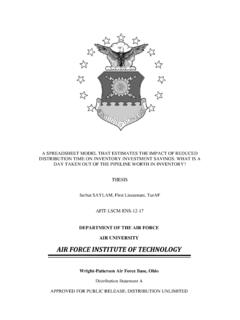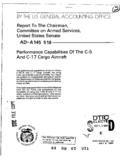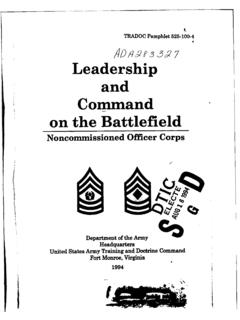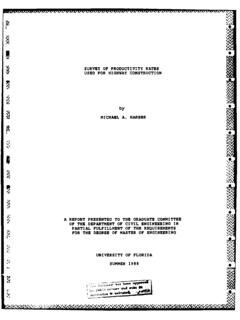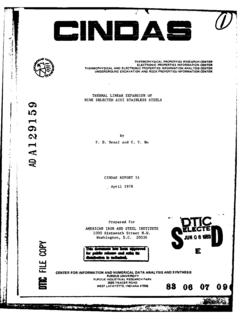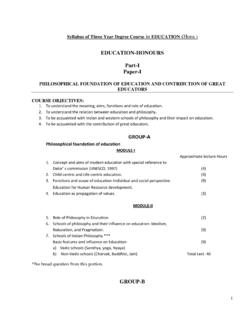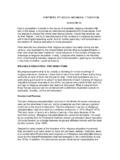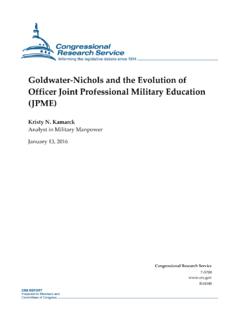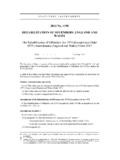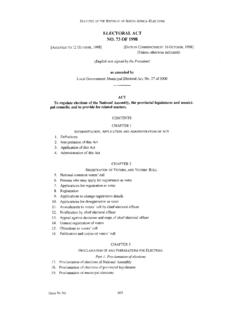Transcription of Unintended Consequences of the Goldwater-Nichols Act
1 Spring 1998/JFQ99 The tenth anniversary of the Goldwater-Nichols Department of Defense Reorga-nization Act of 1986 focused attentionlargely on that law s most apparent andpositive aspects. Much good has derived from Nation has enjoyed a string of successes inwar and in military operations other than law increased cooperation and interoperabil-ity among the services, improved professionalmilitary education, and unified the national mili-tary command mandated under goldwater -Nicholsfundamentally altered relationships between theservices and joint system and between civilianand military sides of the defense insist the law did not go far enough andthey therefore advocate additional reforms.
2 Incertain respects they may be correct. However, inone area the reforms may have already gone toofar. As we advance into the second decade of theGoldwater- nichols era and consider what furtherchanges in defense organization are needed, wemust be careful not to upset the delicate balanceimplicit in civilian control of the supremacy of elected officials has alwaysunderpinned civil-military relations and yetMajor Christopher M. Bourne, USMC, is assigned to Marine ForcesPacific as CENTCOM exercise officer (G-3). Unintended Consequencesof the Goldwater-Nichols ActByCHRISTOPHER M. BOURNEDOD ( Bob McRoy)1818 PGS 1/26/99 3:04 PM Page 99 Report Documentation PageForm ApprovedOMB No.
3 0704-0188 Public reporting burden for the collection of information is estimated to average 1 hour per response, including the time for reviewing instructions, searching existing data sources, gathering andmaintaining the data needed, and completing and reviewing the collection of information. Send comments regarding this burden estimate or any other aspect of this collection of information,including suggestions for reducing this burden, to Washington Headquarters Services, Directorate for Information Operations and Reports, 1215 Jefferson Davis Highway, Suite 1204, ArlingtonVA 22202-4302. Respondents should be aware that notwithstanding any other provision of law, no person shall be subject to a penalty for failing to comply with a collection of information if itdoes not display a currently valid OMB control number.
4 1. REPORT DATE 1998 2. REPORT TYPE 3. DATES COVERED 00-00-1998 to 00-00-1998 4. TITLE AND SUBTITLE Unintended Consequences of the Goldwater-Nichols Act 5a. CONTRACT NUMBER 5b. GRANT NUMBER 5c. PROGRAM ELEMENT NUMBER 6. AUTHOR(S) 5d. PROJECT NUMBER 5e. TASK NUMBER 5f. WORK UNIT NUMBER 7. PERFORMING ORGANIZATION NAME(S) AND ADDRESS(ES) National Defense University,Institute for National Strategic Studies,260 Fifth Avenue SW Bg 64 Fort Lesley J. McNair,Washington,DC,20319 8. PERFORMING ORGANIZATIONREPORT NUMBER 9. SPONSORING/MONITORING AGENCY NAME(S) AND ADDRESS(ES) 10. SPONSOR/MONITOR S ACRONYM(S) 11. SPONSOR/MONITOR S REPORT NUMBER(S) 12. DISTRIBUTION/AVAILABILITY STATEMENT Approved for public release; distribution unlimited 13.
5 SUPPLEMENTARY NOTES 14. ABSTRACT 15. SUBJECT TERMS 16. SECURITY CLASSIFICATION OF: 17. LIMITATION OF ABSTRACT Same asReport (SAR) 18. NUMBEROF PAGES 10 19a. NAME OFRESPONSIBLE PERSON a. REPORT unclassified b. ABSTRACT unclassified c. THIS PAGE unclassified Standard Form 298 (Rev. 8-98) Prescribed by ANSI Std Z39-18 this tradition is eroding fast. Ironically, dimin-ished civilian control stems not from the threatof the man on horseback nor from a defeat onthe battlefield. Instead, the reforms enacted in1986 have undermined relations between the sol-dier and the state. Goldwater-Nichols legislatedsweeping changes intended to rectify the strategicfailures of the Vietnam conflict and the lack ofservice cooperation.
6 The implications of thosechanges have gone unnoticed in the afterglow ofthe Gulf War. Their net effect, however, has beento reverse our long na-tional tradition of civil-ian control over the mili-tary. In the process itgave inordinate politicalpower to the military byelevating the Chairmanof the Joint Chiefs ofStaff almost to the level of his nominal superior,the Secretary of Defense, thereby jeopardizingcivilian the Senate Armed Services Committeeheld its first hearings to consider reorganizing thePentagon in July 1983, Senator Barry Goldwateropened the proceedings thus:The question is, can we, as a country, any longer af-ford a 207-year-old concept that in military mattersthe civilian is supreme?
7 Now, I realize the sanctity ofthe idea of the civilian being supreme. It is a beautifulthing to think about. The question in my mind is, canwe any longer afford to allow the expertise of [profes-sional military]men and be set asidefor the decisions of the civilians whose decisions havenot been wrapped in war[?]We lost in Korea, noquestion about that, because we did not let the mili-tary leadership exercise military judgment. We lost that is the way we are going to do it inthe future, I think we are in s assertion should give every offi-cer pause; it stood the common perception ofcivil-military relations on its head and set the toneof the debate.
8 Many did not recognize the natureof the issues at the time, but the law basically al-tered civil-military relations. While the opera-tional performance of the Armed Forces and thebureaucratic efficiency of DOD have improved,some of the law s provisions have overcompen-sated for the inadequacies of earlier defense reor-ganizations. They invest inordinate authority in asingle military officer and his staff while reducingthe checks and balances within and between theexecutive and legislative practice, Goldwater-Nichols empoweredthe Chairman to act as the de facto equal of theSecretary of Defense and de facto commander ofthe Armed Forces; it empowered military officersto formulate and influence policy far outsidetheir proper sphere; and while expressly statingits intent to the contrary, it took a long step to-ward creating a joint general staff.
9 Intending toimprove effectiveness but not comprehendingfully the complex interrelationships that effectcivilian control, Congress failed to provide for thecommon defense with an establishment that re-flects the basic values of American Is Control?Americans have long invoked the phrasecivilian control of the militarybut usually fail to de-fine or grasp it. The Constitution, which waswritten when the Army consisted of an ill-trainedmilitia that was pressed into service for emergen-cies, does not address the relationship control was moot the military was civil-ian itself. The Founding Fathers ensured a separa-tion and wide dispersal of powers.
10 In that vein,they designated the President as Commander inChief of the Army and Navy but gave Congressthe authorityto declare raise and support and maintain a navy; to make rules for thegovernment and regulation of the land and navalforces; to make all laws which shall be necessary andproper for carrying into execution the framers of the Constitution granted theoffice of Commander in Chief to the Presidentrather than the function of commander, allowinghim to order the forces provided by Congress butnot to determine their size or composition. Theyintended that the President should not enjoy thepolitical and military powers of a European rulerand observed George Mason s warning that thepurse and sword should not fall into the samehands.
